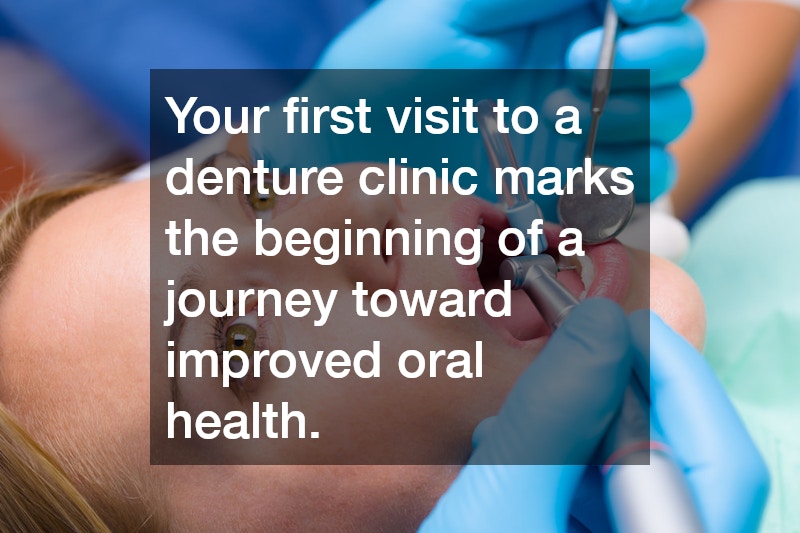Visiting a denture clinic for the first time can bring up a mix of emotions. You might feel hopeful about restoring your smile or nervous about what the process involves.
Whether you’re getting dentures for the first time or replacing an old set, understanding what to expect can help ease your concerns and prepare you for a positive experience.
Modern denture care is far more advanced than it used to be. Today’s clinics focus on comfort, function and aesthetics, with personalised treatment plans to suit your needs. From consultation to impressions, each step is designed to get you closer to a natural-looking and secure smile.
The Initial Consultation
Your first visit to the denture clinic usually begins with a detailed consultation. During this appointment, the dental prosthetist or clinician will ask about your medical and dental history. They’ll want to know why you’re seeking dentures, whether you’ve worn them before and if you have any ongoing concerns or discomfort.
You’ll have the chance to discuss your goals and expectations, including how you want your dentures to look and feel. Whether it’s improved chewing ability, better speech or a more confident smile, the clinician will use this information to create a treatment plan tailored to you.
An oral examination follows. The clinician will check the condition of your gums, any remaining teeth and jaw alignment. If you’ve had extractions or dental surgery recently, they may recommend waiting until the area heals before proceeding. For those with existing dentures, an assessment will determine if adjustments, repairs or a full replacement is needed.
Taking Impressions and Measurements
After the consultation, the next step is to take impressions of your mouth. These moulds are essential for creating dentures that fit comfortably and function correctly. Soft trays filled with a gentle impression material are placed in your mouth to capture the shape of your gums, jaw and any teeth.
In some cases, digital scans may be used in place of traditional impressions. These provide highly accurate data and can be more comfortable for patients with a strong gag reflex or sensitive gums.
Measurements of your bite are also taken to ensure your dentures align properly. This helps to avoid issues with chewing, speaking or jaw strain once the dentures are fitted. Your facial structure, smile line and natural tooth colour will also be noted to design dentures that match your features.
These records are sent to a dental laboratory or created on-site if the denture clinic has an in-house technician. A wax model or trial denture is usually created first, allowing you to try the fit and appearance before the final set is made.
Discussing Your Denture Options
There are several types of dentures available, and the clinician will explain which ones suit your situation best. Full dentures are used when all natural teeth are missing, while partial dentures replace only a few missing teeth. Some patients may also be candidates for implant-supported dentures, which offer extra stability.
The clinician will outline the materials, expected lifespan and daily care required for each option. You’ll also discuss cost, payment options and whether any rebates apply through Medicare, private health funds or Veterans’ Affairs programs.
It’s important to ask questions and share any concerns. A good denture clinic will take the time to ensure you understand the process and feel comfortable moving forward. They may also provide brochures or videos to help you visualise the steps ahead.
Fitting and Follow-Up
Once your final dentures are ready, you’ll return to the clinic for a fitting. The clinician will check the fit, comfort and appearance before making any necessary adjustments. It’s normal to feel a little awkward or uncomfortable at first, as your mouth adjusts to the new shape.
You’ll be advised on how to wear and remove your dentures, how to clean them and what to expect in the first few weeks. Eating soft foods and practising speech sounds can help speed up the adjustment process.
Follow-up appointments are often scheduled within the first few weeks to monitor progress and make any necessary adjustments. These visits are important to ensure your dentures remain comfortable and function as intended.
If you experience persistent pain, sore spots or looseness, contact the clinic as soon as possible. Ongoing discomfort is not normal and can often be fixed with a small adjustment or reline.
Your first visit to a denture clinic marks the beginning of a journey toward improved oral health and renewed confidence. By understanding each step of the process, from consultation to fitting, you can approach the experience with confidence and a sense of peace of mind.
Today’s denture technology offers solutions that are more natural-looking and better-fitting than ever before. With the guidance of an experienced clinician and proper follow-up care, your dentures can help you eat, speak and smile with comfort and ease.
A reputable denture clinic will make your care and comfort their top priority, helping you feel supported from the first visit and beyond.




